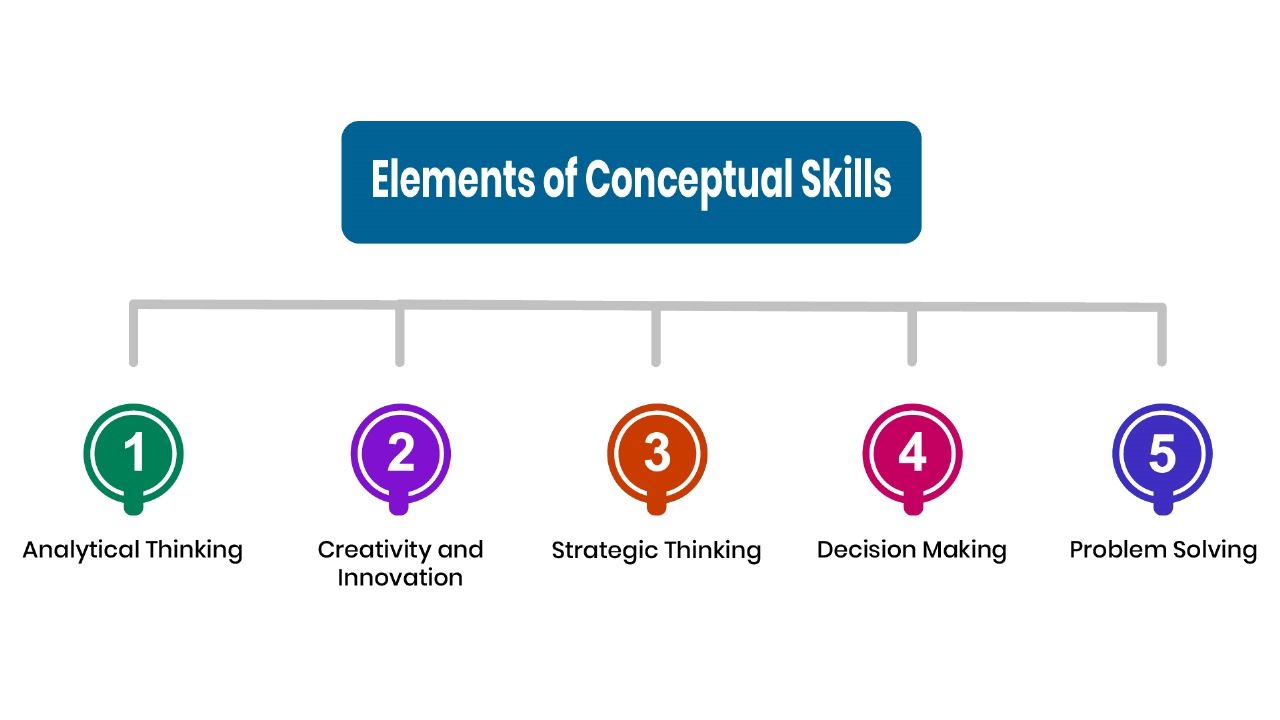
Overview
Every successful leader or manager needs more than just technical know-how. They must be able to see the bigger picture, solve problems creatively, and guide teams toward long-term goals. These abilities are known as conceptual skills. But what exactly do they mean, and why are they so important in management today? In this blog, we’ll break down the conceptual skills meaning, explore how they apply in different professional contexts, and share real-life examples. Whether you’re preparing for leadership roles or aiming to improve your decision-making, understanding conceptual skills will give you a competitive edge.
Key Point:
Conceptual skills mean big-picture thinking, problem-solving, and strategic planning.
Important for managers and leaders to make informed decisions and innovate.
Key elements: analytical thinking, creativity, strategy, decision-making, problem-solving.
Used in business, education, healthcare, and government for effective leadership.
Benefits: better decisions, stronger leadership, more innovation, and career growth.
Conceptual Skills Meaning: A Simple Definition
So, what do conceptual skills mean?
In simple terms, conceptual skills mean the ability to think abstractly, analyze complex situations, and develop innovative solutions. Unlike technical skills, which deal with specific tasks, conceptual skills focus on big-picture thinking. They allow managers and leaders to connect ideas, recognize patterns, and foresee challenges before they arise.
For example, when a company faces declining sales, a manager with strong conceptual skills in management won’t just push for more marketing. Instead, they’ll analyze market trends, customer behavior, and competitor strategies to craft a long-term solution.
Why Conceptual Skills Matter in Management
In the corporate world, conceptual skills in management are critical for decision-making and strategy development. Here’s why:
- Strategic Vision: Managers with strong conceptual abilities can align organizational goals with market opportunities.
- Problem-Solving: They identify the root cause of problems rather than just addressing symptoms.
- Innovation: Conceptual thinkers often introduce new ideas and creative solutions.
- Leadership: These skills help leaders inspire teams and navigate uncertainty.
When leaders lack conceptual thinking, they may focus too much on short-term fixes, missing long-term opportunities for growth.
Also Read:What Are Interpersonal Skills?
Key Elements of Conceptual Skills
To better understand conceptual skills meaning, let’s break them into core components:
1. Analytical Thinking
The ability to analyze complex data, trends, and information to make informed decisions.
2. Creativity and Innovation
Coming up with new ideas and thinking outside the box when traditional methods fail.
3. Strategic Thinking
Setting long-term goals and identifying the steps needed to achieve them.
4. Decision-Making
Evaluating multiple options and choosing the best path forward.
5. Problem-Solving
Identifying challenges and creating actionable solutions that benefit the organization.
These elements work together to form a foundation for effective leadership and management.
Examples of Conceptual Skills in Action
To fully grasp conceptual skills meaning, it’s helpful to look at practical examples.
- Business Strategy Development: A CEO predicts a market shift toward digital products and leads the company through a successful transformation.
- Crisis Management: A manager analyzes a sudden supply chain issue and quickly develops backup plans to minimize disruption.
- Team Leadership: A project leader envisions how diverse team skills can be combined to achieve innovative results.
- Policy Creation: An HR manager creates policies that balance company goals with employee satisfaction.
These scenarios highlight how conceptual skills in management influence success across industries.
Conceptual Skills vs. Technical and Human Skills
Management expert Robert Katz categorized managerial skills into three main types: technical skills, human skills, and conceptual skills.
- Technical Skills: Hands-on abilities to perform specific tasks, like coding, accounting, or operating machinery.
- Human Skills: Interpersonal skills like communication, teamwork, and conflict resolution.
- Conceptual Skills: Abstract thinking and strategic planning to connect ideas and guide overall direction.
While all three are important, the higher you move in an organization, the more essential conceptual skills become. Executives and senior managers rely heavily on these abilities to shape company policies and future growth.
How to Develop Conceptual Skills
Like any skill set, conceptual abilities can be improved with practice. Here are a few strategies:
- Read Widely: Explore topics beyond your field to expand your perspective.
- Practice Critical Thinking: Challenge assumptions and ask “why” and “what if” questions.
- Engage in Strategic Planning: Participate in organizational goal-setting and long-term planning.
- Learn from Leaders: Study successful leaders and how they made decisions.
- Problem-Solving Exercises: Regularly analyze case studies or hypothetical scenarios.
Building strong conceptual skills in management requires curiosity, reflection, and a willingness to see problems from multiple angles.
Conceptual Skills in Different Professions
In Business Management
Managers use conceptual abilities to align business goals with market demands and forecast industry trends.
In Education
School leaders apply conceptual thinking to design curriculums that prepare students for future challenges.
In Healthcare
Hospital administrators need conceptual skills to balance patient care with financial sustainability.
In Government
Policy makers use conceptual thinking to develop laws and regulations that serve society in the long run.
This shows that conceptual skills are not limited to corporate management they are valuable in nearly every profession.
Benefits of Strong Conceptual Skills
Having well-developed conceptual skills offers several advantages:
- Better ability to predict and adapt to change.
- Improved decision-making under pressure.
- Stronger leadership and team guidance.
- Increased innovation and creativity within organizations.
- Enhanced career growth and opportunities for promotion.
In short, conceptual thinkers often become the visionaries and problem-solvers in their fields.
Conclusion
So, what do conceptual skills mean? They are the ability to think beyond day-to-day tasks, connect ideas, and create strategies for long-term success. From analyzing problems to making innovative decisions, these skills play a vital role in leadership and management.
CV Circle recommends developing conceptual skills in management whether you’re aiming for a leadership position or simply want to improve your professional capabilities. These skills help you see the bigger picture, anticipate future challenges, and inspire others to achieve shared goals.